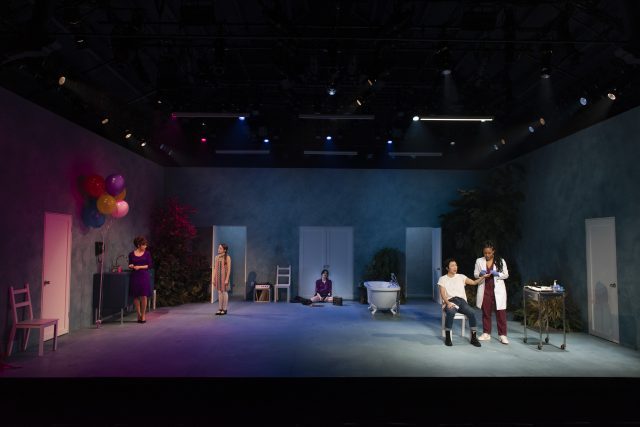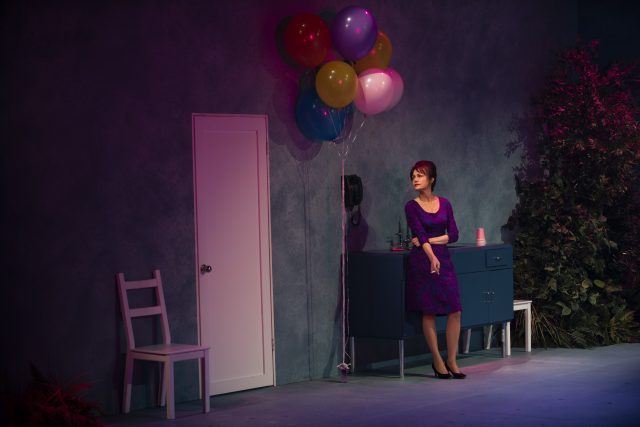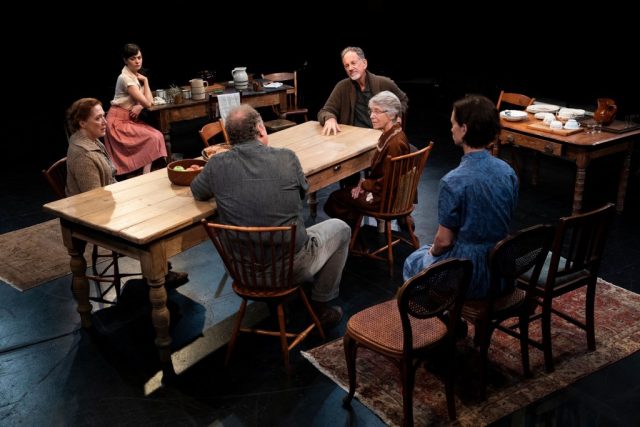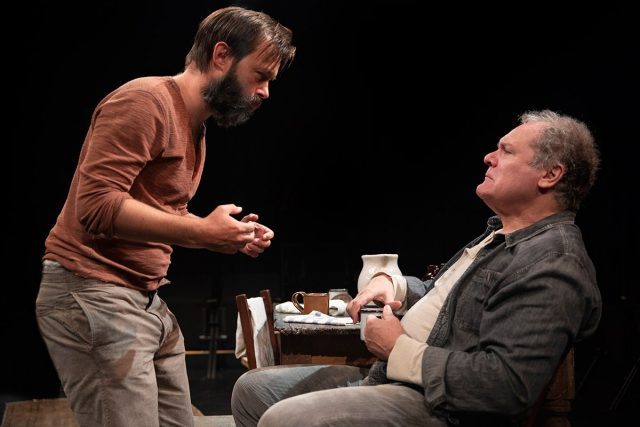
Alice Birch’s Anatomy of a Suicide takes place in three concurrent time periods (photo by Ahron R. Foster)
Atlantic Theater Company
Linda Gross Theater
336 West 20th St. between Eighth & Ninth Aves.
Tuesday – Sunday through March 15, $51-$91.50
866-811-4111
atlantictheater.org
The beginning of the Atlantic’s US premiere of Alice Birch’s Anatomy of a Suicide is a chaotic cacophony of words and images, barreling at the audience in three parts at the same time. You’ll find yourself shifting your eyes and ears constantly, struggling to understand what exactly is happening. But stick with it; in the hands of director Lileana Blain-Cruz, the play slowly takes shape and you’ll fall into the unique and compelling rhythm of its multiple, interconnected narratives.
Mariana Sanchez’s open set is divided into three sections by invisible barriers, signaled by several doors at the back and Jiyoun Chang’s poignant lighting. There is a cast-iron tub in the middle and two more doors at the sides, through which chairs, tables, and other props are brought. Hannah Wasileski’s projections subtly change the texture of the walls in soft shades of blue, referencing changes in time. Stage right, Carol (Carla Gugino) has just attempted to kill herself, much to the dismay of her caring husband, John (Richard Topol). “It was just an accident,” she coldly claims. “You slit your fucking wrists,” he responds. In the center, a drugged-out Anna (Celeste Arias) is debating semantics with an upset doctor (Vince Nappo). “I sound like I’m trying — is the point though isn’t it cos the veracity of the whole thing lies in how likely it is I’d say what you’re claiming I said,” she argues. “Veracity — you can’t stand up straight but you can say veracity,” he says. And at stage left, another doctor, the very serious Bonnie (Gabby Beans), is being hit on by a bleeding patient, Jo (Jo Mei). “Do you want to grab a drink,” Jo asks as Bonnie tends to her wounded hand, not answering. “That is an incredibly long pause to follow that question,” Jo says, to which Bonnie replies, “You’ve had a lot of painkillers. You shouldn’t drink anything for a while.” Those three interactions establish the main characters in what becomes a gripping drama about the psychological legacies parents leave their children and the biology that determines depression.

Carla Gugino stars as a wife and mother battling depression in US premiere at the Atlantic (photo by Ahron R. Foster)
You’ll probably guess the relationship between Carol, John, and Anna fairly quickly, but the connection between Anna, Bonnie, and Jamie (Julian Elijah Martinez) will take a little longer, offering a clever surprise. Most of the excellent cast portray multiple characters, with Jason Babinsky, Miriam Silverman, Nappo, and Mei playing various friends, relatives, and coworkers and Ava Briglia taking on all the child roles. It can get confusing at times, but Birch (Lady Macbeth, Revolt. She Said. Revolt.), who won the prestigious Susan Smith Blackburn Prize for Anatomy, and Obie winner Blain-Cruz, who has guided such complex, experimental works as Fefu and Her Friends, Marys Seacole, and The Death of the Last Black Man in the Whole Entire World AKA the Negro Book of the Dead, eventually circle back with telling reveals and small shocks, making sure we feel the power of the story even if we can’t grasp hold of every word. Gugino (A Kid Like Jake, The Road to Mecca), Arias (Uncle Vanya), and Topol (Indecent, The Dance of Death) lead an exemplary ensemble (Gugino and Arias look particularly resplendent in Kaye Voyce’s lovely costumes), the actors hitting their marks like clockwork amid the overlapping turmoil, characters from each time period occasionally spouting key lines of dialogue in unison.
It’s like we’re in the mind of a depressed, suicidal person, experiencing what they’re experiencing as they battle a world filled with demons, an unrelenting barrage that they may not break free of. The sparkling white tub, which is never moved, is a constant reminder of what Carol, Anna, and Bonnie are facing as those around them seek to protect and love them, which doesn’t always make a difference. Performed without an intermission, it’s a tense and gripping hundred-minute journey into the legacies of mental illness, especially in women’s experiences. It’s not an easy play to watch, but you won’t be able to turn away.

